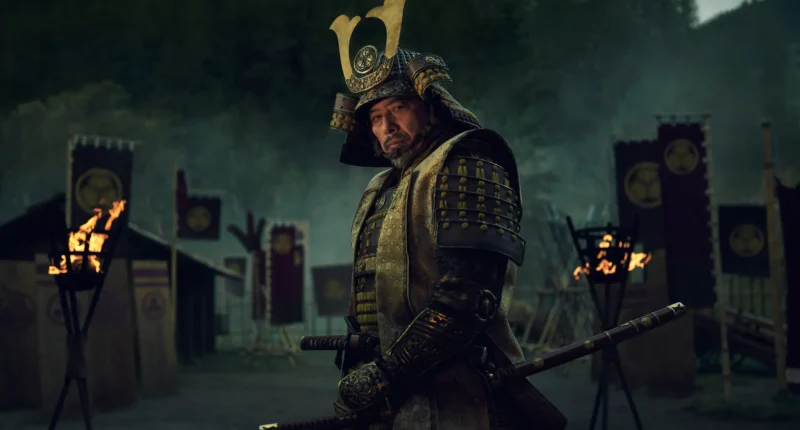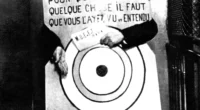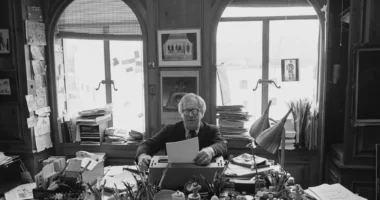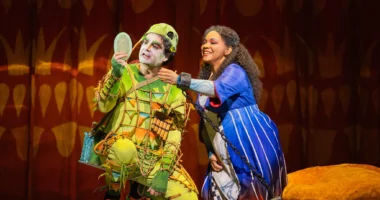Episode 1: ‘Anjin’
Episode 2: ‘Servants of Two Masters’
The ghostly Dutch trading vessel Erasmus materializes out of the fog, dwarfing the homes of a small coastal village like a Lovecraft-ian monster emerging from the sea. It may as well be one.
There is no shogun, no unquestioned and absolute ruler, holding the country’s fractious lords together when “Shogun” begins. The Erasmus, with its cargo of guns and ammo and its irascible English pilot, is the harbinger of a world war into which Japan doesn’t even realize it’s been drafted. Its flag means death.
Adapted by Rachel Kondo and Justin Marks from the 1975 novel by James Clavell, “Shogun” co-stars Cosmo Jarvis as John Blackthorne, the Erasmus’s pilot, or navigator. Blackthorne is part of a small fleet commissioned by England to find the mysterious and very wealthy island of Japan, and harry any Catholic forces along the way. This is a tall order: England’s Catholic rivals, Portugal and Spain, have kept their lucrative route to East Asia a secret from the rest of the world — even as they kept the existence of England, and Protestantism in general, a secret from their Japanese trading partners.
By the time Blackthorne and what’s left of the fleet’s crew wash ashore, they’re down to a dozen or so bedraggled, starving and half-delirious men, looking and acting every bit like the barbarians they’re held to be by the heirs of Japanese civilization. This is no fit state under which to meet Lord Yabushige (Tadanobu Asano), an opportunistic sadist who aims to hang onto the ship and its weaponry for himself.
Yabushige defies the wishes of his Portuguese Jesuit translator and spares Blackthorne, who seems a mere pirate until his Protestant desecration of the Catholic cross tips off the nobleman to his true motivations. Yabushige does, however, slowly boil a member of the crew to death to further his studies of dying men’s last moments. Samurai or serial killer: six of one, half dozen of the other.
While Yabushige’s cruelty gets laid on pretty thick, “Shogun” does not render that cruelty as some innately Japanese feature. The show is set in 1600, as Europeans have been waging centuries of brutal religious warfare and burning heretics alive.
Indeed, one of the show’s smartest moves is pitting Blackthorne against Catholic interlocutors, at least implicitly reminding the audience that he’d be even worse off in Lisbon than he is in Osaka. These Catholics include Rodrigues (Nestor Carbonell), a salty merchant navigator who first befriends and then betrays Blackthorne, despite the Englishman saving him from drowning; the Jesuit priest Father Martin Alvito (Tommy Bastow), who defies his superiors and honestly translates for Blackthorne instead of sabotaging him; and most importantly Lady Mariko (Anna Sawai), a Catholic noblewoman hiding the pain of a dark past.
Mariko, too, translates Blackthorne accurately, even when she’s convinced he’s lying about her Portuguese mentors’ secret plans of conquest and domination. Though a faithful Catholic, she’s as devoted to the show’s real main character, Lord Toranaga (Hiroyuki Sanada), as even his most fanatical soldiers, and wouldn’t dare deceive him.
Toranaga’s the kind of guy who commands that level of respect, especially when compared to his sordid vassal, Yabushige, or his scheming rival, Lord Ishido (Takehiro Hira). We meet Toranaga as he is named president of the Council of Regents, a group of five lords bequeathed shared rule by their late overlord until his young heir, placed in Toranaga’s care specifically, comes of age. Toranaga’s fellow regent Ishido is making a power play against him, and since Ishido has the backing of the Council’s two Catholic lords, it’s not a matter of if he takes Toranaga’s head, but when.
Blackthorne’s arrival gives Toranaga the narrow opening he needs. When the ruler receives word that the newcomer’s very existence is driving the Portuguese Jesuits mad, he realizes that Blackthorne is as valuable a weapon as anything aboard his ship. He takes the “anjin” (“pilot”) into custody, in that way delaying his own execution until after he kills Blackthorne, which the Catholic lords insist must be done first. (It’s a pretty neat trick.)
Importantly, Blackthorne tells Toranaga the truth about Japan’s European partners: how they divided the globe between themselves, how Portugal believes it owns Japan, and how it is secretly building an army of Catholic Japanese mercenaries in Macao to overthrow any non-Catholic lord who gets in their way.

It is the most effective scene in either episode of the show’s dual premiere. Jarvis makes Blackthorne believably fervent. Sanada makes Toranaga look like he’s thinking a million miles a minute, even as he physically restrains himself from reacting. But members of the court can’t help it. They audibly gasp, especially when Toranaga asks again if the Portuguese actually say they “own” Japan. It sounds insane, and what’s more dangerous than armed men who believe in something insane?
Of the two episodes in this initial offering, the former is by far the weaker. For one thing, it falls victim to a bad case of first episode syndrome: a tendency to front-load shows with attention-grabbing material that is much blunter and broader than what follows. (I always think of “Billions,” which opened with a bound and gagged Paul Giamatti being used as a human ashtray and toilet.)
Here, the voyeurism and torture had something of the air of “This ain’t your average samurai story”; the very expensive but rather staid look of the series, with all the usual medieval peasant grime and aristocratic splendor, gives lie to that claim, at least visually. At any rate, when you’re killing babies in side plots and boiling men alive onscreen in your very first outing, where do you go from there?
You go in an entirely different direction, as it turns out. It’s not that the second episode lacks for spectacle: the murderous rescue of Blackthorne by Yabushige’s “bandits,” and the genuinely shocking rampage of a maid-turned-assassin through Toranaga’s quarters on the hunt for Blackthorne, provide plenty. What does the trick is exposition, of all things. The multiple scenes in which characters are given the lay of the land — Father Martin and Blackthorne explaining to Toranaga their nations’ conflict; a Franciscan prisoner describing Toranaga’s rivals to Blackthorne; Blackthorne outlining the Spanish/Portuguese conspiracy for world domination to the court — may be inelegant, but they sure are engaging.
These expository dialogues add much-needed density to the comparatively airy first episode. Suddenly, a straightforward adventure story about a cool lord and a fish out of water is a complex latticework of countries, religions, underlings, rivalries, assassinations, alliances and conspiracies — all on top of the basic culture clash that drives Blackthorne’s narrative. Threats can come at any character from any direction. Simply staying alive requires both Blackthorne and Toranaga to bob and weave like they’re making their way through razor wire, and one wrong move will slice them to ribbons.
Try as one might to avoid making the obvious comparison, there’s no way around it: It’s very “Game of Thrones.” (Yes, James Clavell’s novel preceded George R.R. Martin’s, but any sweeping medieval-ish epic on TV today owes a lot to the house that Ned built.) This is a good thing. A story about an actually noble nobleman, beset by rival houses, in a world where adherence to rigid rules of duty and honor can make the difference between life and death: People kind of like that stuff.
The fantasy is the politician willing to risk his life to do the right thing; the mystery is whether or not he’ll pull it off. (It’s not that big a mystery if you’ve read the books upon which the shows in question are based, but still.) The combination is a how-to manual for getting viewers to tune in next week.






